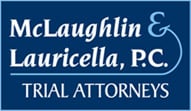The Legal Intelligencer – September 24, 2008
By Amaris Elliott-Engel
A $2 million settlement has been reached in a wrongful death and survival action over the death of a 19-year-old who drank at the home of a friend before being electrocuted on the Southeastern Pennsylvania Transportation Authority Route 100 line.
The deceased’s parents, Benjamin S. and Catherine L. Breskman, of Gladwyne, brought a wrongful death and survival action against SEPTA and against Donald F. and Sandra G. Daly, of Bryn Mawr, at whose home Brian E. Breskman visited a friend on the night he died.
The Dalys agreed to pay $2 million and SEPTA agreed to pay $50,000, according to a copy of the settlement general release in Breskman v. Southeastern Pennsylvania Transportation Authority. Plaintiffs’ counsel , Slade H. McLaughlin of McLaughlin & Lauricella, said the case was worth more than $2,050,000, but there was no worthy reason to ask for more when the Dalys’ homeowner’s insurer agreed to settle for the full policy limit. The settlement was reached Sept. 8th.
Brian Breskman was drinking cocktails at the home of a high school football buddy on May 25, 2007, when he and his friends, Sam Daly and Ben Kissner, decided to go out to buy cigars and chewing tobacco, according to the plaintiffs’ complaint.
Breskman’s parents argued that the Dalys had a duty to disallow underage drinking at their home. “The Dalys knew, or should have known, that the boys were intoxicated, yet told the boys to walk to the 7-Eleven store that was approximately one mile away, furnishing flashlights for the boys’ use and telling them to put on bright colored shirts,” the complaint said.
During their outing, police officers of the Radnor Township Police Department arrested Sam Daly and Kissner around midnight for underage drinking, but Breskman had run away before the officers approached, according to the complaint and an interview with McLaughlin.

The plaintiffs argued that under the “Restatement (Second) of Torts” Section 323 the Dalys were negligent because of social host liability for underage drinkers in their home, McLaughlin said.
McLaughlin said he would have argued at trial that the Dalys knew or should have known of the trio’s intoxication because the officers arresting Breskman’s friends, Sam Daly and Kissner, found them to be glassy-eyed and staggering.
McLaughlin said he had an expert, toxicologist Richard Saferstein, of Mount Laurel, N.J., who was going to say Breskman’s judgment was clearly impaired by intoxication.
Breskman had just finished his first year at Pennsylvania State University and was hanging out the night of his death with some of his best friends from his high school years from Episcopal Academy, McLaughlin said.
The Dalys said in their answer that Sam Daly, Breskman and Kissner consumed alcoholic beverages without their knowledge. The Dalys denied “that any alcohol was consumed on the evening in question with the Dalys’ knowledge, consent or permission, or that it was furnished, supplied, served or provided by the Dalys,” the answer said.
The Dalys admitted that Sandra Daly asked the boys to take flashlights and wear white T-shirts when walking to the store, but the Dalys denied knowing the boys had been drinking, the answer said.
Michael P. Dignazio, a solo practitioner in Media who was the Dalys’ personal counsel, said if the case had gone to trial no liability would have been found against the Dalys.
Dignazio said that while the case was pending, Donald Daly died, and it was difficult for Sandra Daly to proceed in litigation while she was mourning. Settling the case was the best option for the family, he said.
“My client was seeking closure,” Dignazio said. “When the insurance carrier was willing to settle within the policy limits, we thought it was the best thing to do to bring closure, not only to the Daly family but the Episcopal Academy community.”
Allan R. Bunker of Comeau & Bunker was defense counsel of record and was assigned to represent the Dalys by their homeowner’s insurance company, Dignazio and Bunker said.
The plaintiffs argued that SEPTA was negligent because the third rails of the Route 100 line near the Rosemont Station weren’t covered except at the top, the complaint said.
The third rails of the inbound and outbound tracks of the Rosemont station were readily accessible from pedestrian paths that crossed from one side of the tracks to the other, according to the complaint.
“The danger of pedestrians inadvertently coming into contact with high-voltage electricity used to power SEPTA conveyances is obviously and significantly less when the electricity is supplied through overhead wires, as on other SEPTA commuter rail lines, or through the third rails of its subway lines where the track area is submerged well below the level of the passenger platform area… SEPTA knew this but acted in reckless, wanton and/or willful disregard of that knowledge,” the plaintiffs’ complaint said.
SEPTA said in its answer that Breskman was legally intoxicated at the time of the accident and denied negligence.
SEPTA defense counsel Mark E. Gottlieb of Anderson Kill & Olick didn’t respond to a request for comment.
McLaughlin said he believes both defendants’ theories of defense would have involved the argument that Breskman was old enough to make a decision about drinking alcohol and running away from police, but McLaughlin said that was going to be “a little difficult to do because he was such a good kid.”
McLaughlin said the settlement brought closure for the Breskman family because discovery in the case provided answers to questions they had about their son’s death.
“The best part for the parents: They found out a lot of information they didn’t have,” McLaughlin said. “They have closure because they have the information they didn’t have. It’s justice done even though the case didn’t go to trial.”
No judge had been assigned to the case, McLaughlin said. According to the docket, Philadelphia Common Pleas Judge William J. Manfredi would have heard the projected future court dates in the case.
Nancy Rhoads was plaintiffs’ co-counsel.




